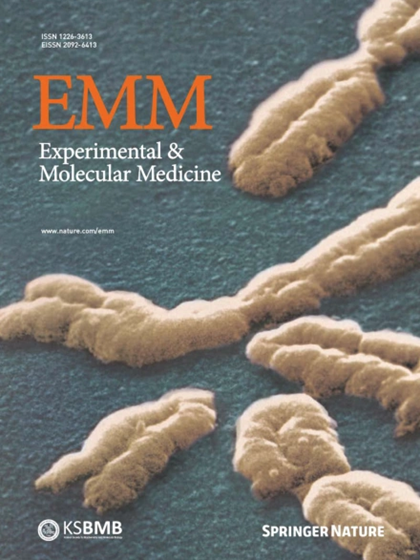5 -羟色胺通过与人粘膜组织相互作用减轻肿瘤坏死因子诱导的肠道炎症。
IF 9.5
2区 医学
Q1 BIOCHEMISTRY & MOLECULAR BIOLOGY
引用次数: 0
摘要
肠道拥有人体最大的免疫系统和周围神经系统。肠脑轴协调中枢和肠神经系统之间的交流,在调节整体身体功能和肠道内稳态方面发挥关键作用。在这里,使用人体三维体外培养模型,我们研究了肠道产生的神经调节剂血清素对免疫细胞和肠组织相互作用的影响。血清素主要通过影响趋化因子的表达来减弱肿瘤坏死因子诱导的促炎反应。5 -羟色胺通过重塑肠道组织,在不与细胞直接接触的情况下影响组织迁移单核细胞的表型和分布。总之,我们的研究结果表明,血清素在肠-脑轴组分之间的交流中起着至关重要的作用,调节单核细胞的迁移和可塑性,从而促进肠道稳态和炎症的进展。关注神经调节剂在肠道炎症中的作用的体内研究显示出有争议的结果,突出了人类实验模型的重要性。此外,我们的研究结果强调了基于人类细胞模型的人类健康研究的重要性,并表明血清素信号通路是炎症性肠病的新治疗靶点。本文章由计算机程序翻译,如有差异,请以英文原文为准。

Serotonin attenuates tumor necrosis factor-induced intestinal inflammation by interacting with human mucosal tissue
The intestine hosts the largest immune system and peripheral nervous system in the human body. The gut‒brain axis orchestrates communication between the central and enteric nervous systems, playing a pivotal role in regulating overall body function and intestinal homeostasis. Here, using a human three-dimensional in vitro culture model, we investigated the effects of serotonin, a neuromodulator produced in the gut, on immune cell and intestinal tissue interactions. Serotonin attenuated the tumor necrosis factor-induced proinflammatory response, mostly by affecting the expression of chemokines. Serotonin affected the phenotype and distribution of tissue-migrating monocytes, without direct contact with the cells, by remodeling the intestinal tissue. Collectively, our results show that serotonin plays a crucial role in communication among gut–brain axis components and regulates monocyte migration and plasticity, thereby contributing to gut homeostasis and the progression of inflammation. In vivo studies focused on the role of neuromodulators in gut inflammation have shown controversial results, highlighting the importance of human experimental models. Moreover, our results emphasize the importance of human health research in human cell-based models and suggest that the serotonin signaling pathway is a new therapeutic target for inflammatory bowel disease. The gut–brain axis involves communication between the brain and the gut, which is important for maintaining gut health. Here the authors explored this by studying serotonin’s role in gut inflammation using a three-dimensional human cell model. They used intestinal organoids to mimic human gut conditions. These organoids were treated with serotonin and TNF to study their effects on gut cells and immune responses. The researchers found that serotonin reduced TNF-induced inflammation by altering gene expression related to immune cell movement. The study showed that serotonin can decrease the production of certain inflammatory signals in the gut, potentially reducing inflammation. This suggests that targeting serotonin could help treat inflammatory bowel disease (IBD). In conclusion, serotonin plays a role in controlling gut inflammation, offering insights into new treatments for IBD. Future research could explore serotonin’s broader impact on other inflammatory diseases. This summary was initially drafted using artificial intelligence, then revised and fact-checked by the author.
求助全文
通过发布文献求助,成功后即可免费获取论文全文。
去求助
来源期刊

Experimental and Molecular Medicine
医学-生化与分子生物学
CiteScore
19.50
自引率
0.80%
发文量
166
审稿时长
3 months
期刊介绍:
Experimental & Molecular Medicine (EMM) stands as Korea's pioneering biochemistry journal, established in 1964 and rejuvenated in 1996 as an Open Access, fully peer-reviewed international journal. Dedicated to advancing translational research and showcasing recent breakthroughs in the biomedical realm, EMM invites submissions encompassing genetic, molecular, and cellular studies of human physiology and diseases. Emphasizing the correlation between experimental and translational research and enhanced clinical benefits, the journal actively encourages contributions employing specific molecular tools. Welcoming studies that bridge basic discoveries with clinical relevance, alongside articles demonstrating clear in vivo significance and novelty, Experimental & Molecular Medicine proudly serves as an open-access, online-only repository of cutting-edge medical research.
 求助内容:
求助内容: 应助结果提醒方式:
应助结果提醒方式:


